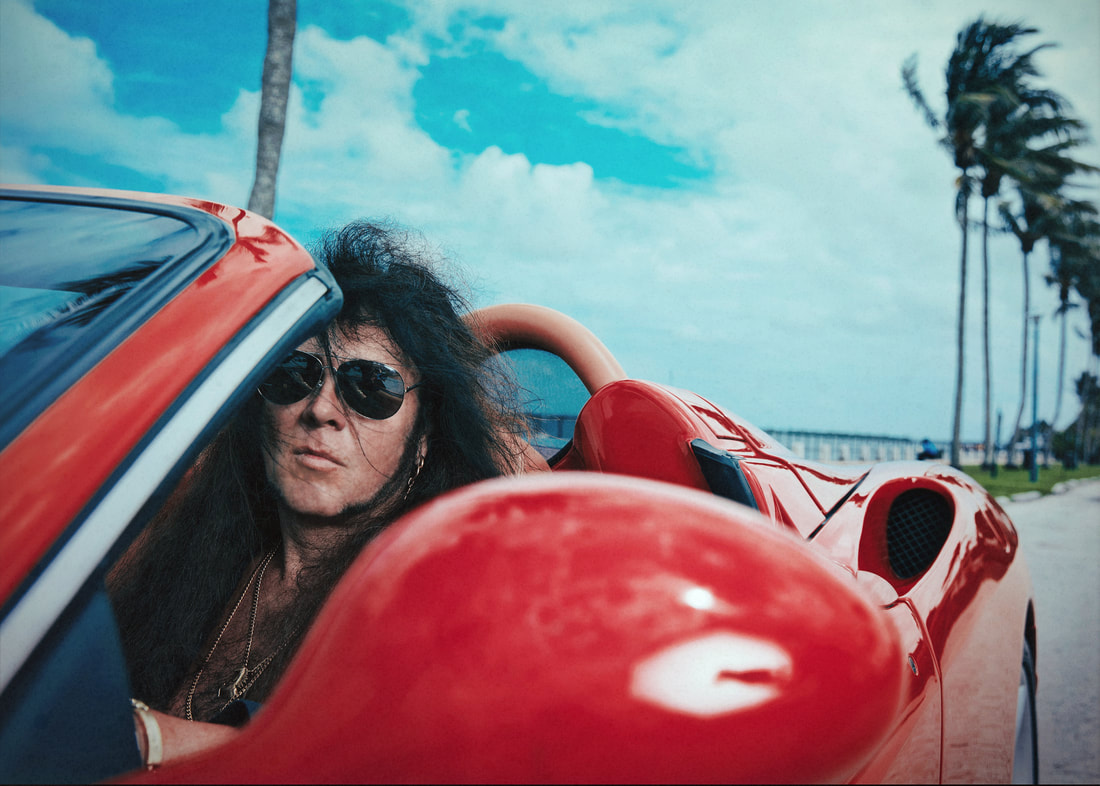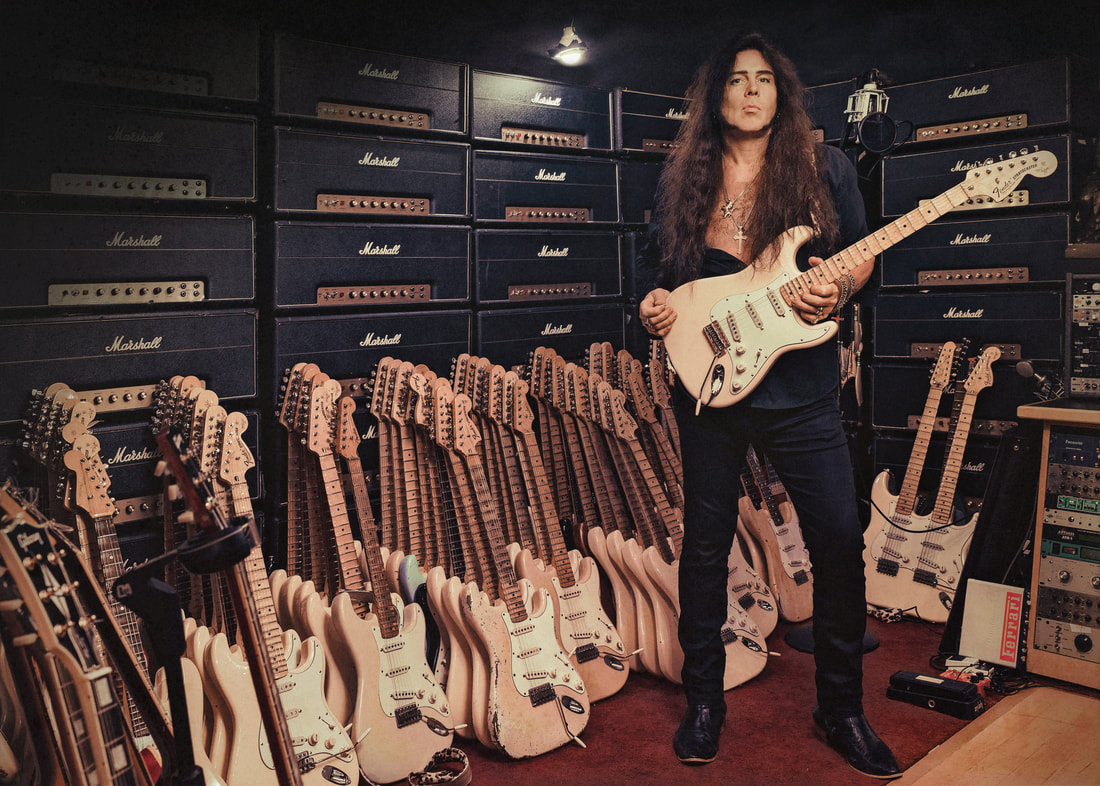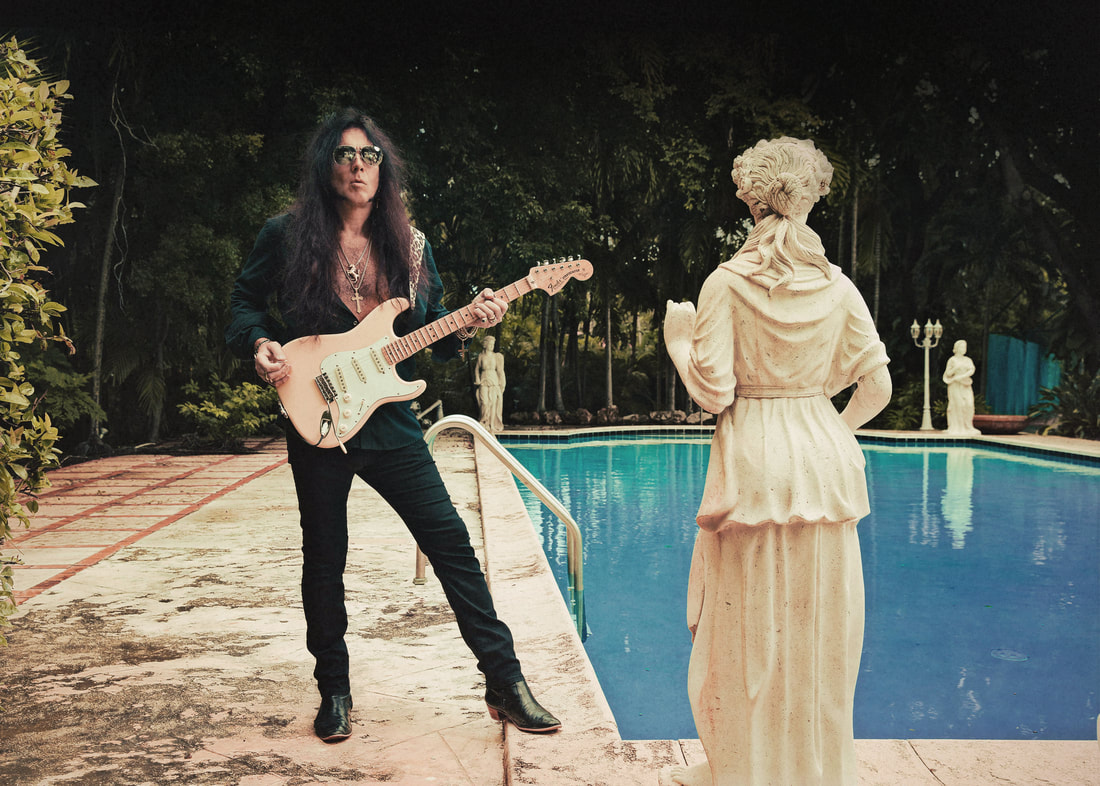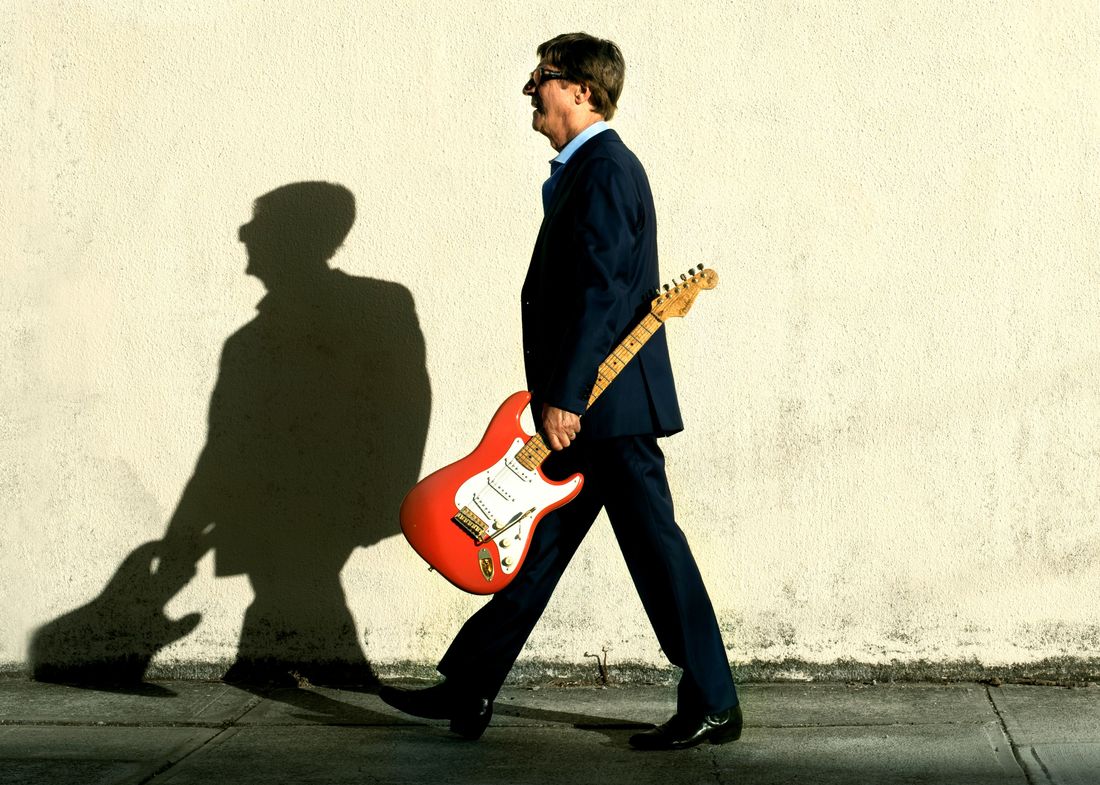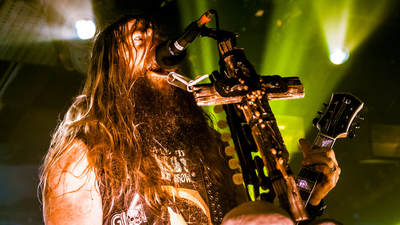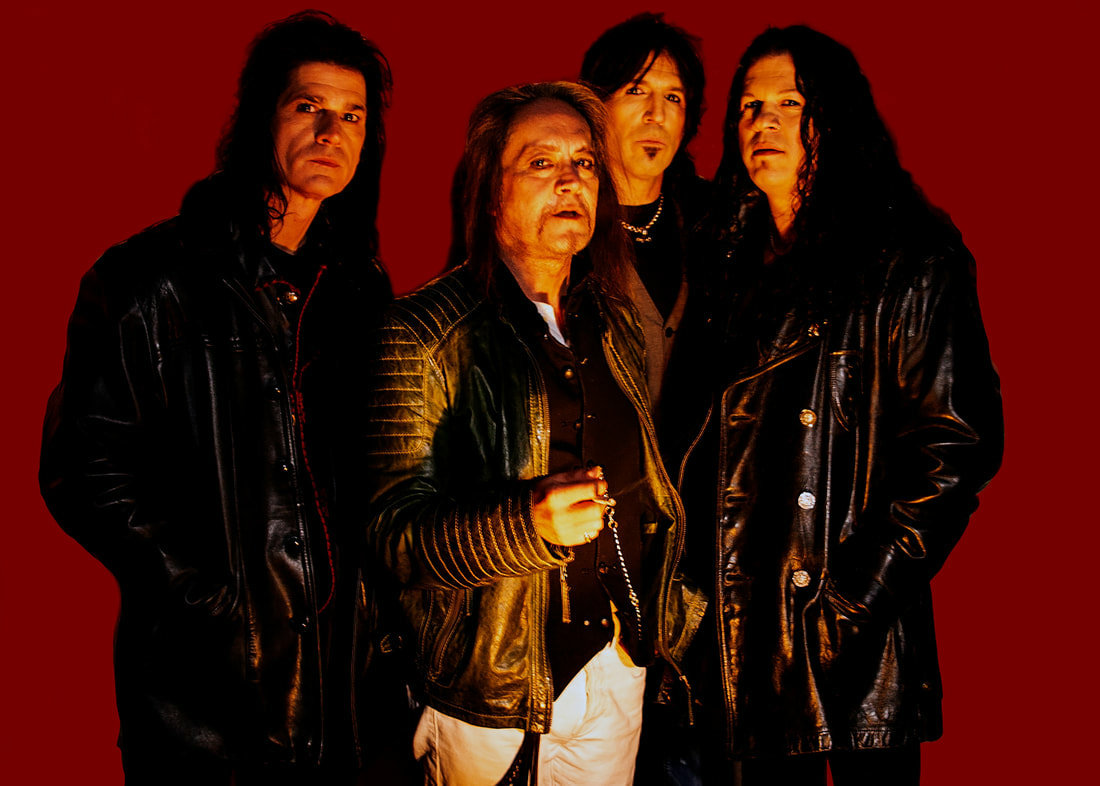|
With a reputation for being moody, hard to please, and difficult to work with, Yngwie Malmsteen is anything but when we sit town to chat with him. Has the notorious Swede mellowed with age? On the evidence of his new blues album 'Blue Lightning' - his first with new label Mascot - it would certainly seem so. Swapping his infamous neo-classical approach to cover some of his favourite songs (as well as adding a few fitting originals), the former Alcatrazz player is revealing a new side to his style. We caught up with Yngwie to chat about the disc, his approach, and west coast sensibilities. Trial by fire; Rod Stewart.
Hi Yngwie, how are you?
Good! My head is spinning around; I feel like I’ve been under a Gestapo interrogation here! I’ve done fifty-two interviews in six days. So who knew Yngwie could sing the blues? Wow! Yeah, well I’ve been doing it for a long time. I used to do it when I was a kid: before I came to America I was a singer in a band full time. You know the last seven or nine years or so I’ve been singing in my band anyway; so I’ve just been singing on all the records, and live and everything. It’s kind of a cool thing. I like it! Has this recent transition to singing more been difficult for you, or has it been a natural progression? It’s been pretty natural. I mean, it’s a lot more demanding when you go on the road because, you know when you do like six, seven, or maybe eight shows in a row it takes its toll; whereas before I didn’t have to worry about that as much. In fact, about a year ago, I did fourteen in a row and that was, like, too much! [laughing] So, that’s the one thing. I was just out with Steve Vai and Zakk Wylde. Zakk sings too you know, and me and him used to talk about it and laugh about it, like; “Remember when we used to just play the guitar? I liked that more!” Have you thought of maybe, in a live respect, to going back to just guitar, and bringing a singer back? Or, do you just really enjoy the singing now? Right now, this is what I want to do. You're known to have perfect pitch; Is that a massive help for your singing? Yeah, it is, and it’s a good thing. It’s kind of a curse too, because whenever you hear stuff on the radio or hear anything, you know when it’s not in tune, and it’s almost painful! It really, really bothers you, you know? I’m very pitch conscious. In respect to singing and playing at the gigs, are there any songs that are really difficult to sing and play? Yeah, some of them are a little harder than others. This album won’t be any problem at all, but when I write songs, I want to make sure that works live. Your new label Mascot suggested the idea of a blues album to you, didn't they? Yeah, I mean they weren’t the first to suggest it to me. In the last 20 or 30 years, it’s all I’ve been hearing! “You should do a blues album!” Although I don’t really think this is a blues album, it’s more like a bluesy album, you know what I mean? It felt like it was a good time to do it, so I said; “Okay, let’s do it”. The thing is, when I was recording the album, I was touring at the same time. I was touring, and I would come back, I was touring and I would come back. So it was kind of an interesting way of doing it, although I’ve been doing that the past few albums anyway. You must have a great work ethic? I try to anyway! [laughing] What I have, as a luxury you could say, is my studio. I go in the studio when I feel inspired: If I don’t feel like going in, I don’t go in. Whereas in the past, that was impossible. Then, when you’re on stage it’s different, because you have thousands of people in front of you, so that’s the automatic kick, you know? In the studio I don’t like to just do the parts, I don’t like to go in and go; “Yeah, I’m going to record this part now” - I don’t like doing that. I like to feel inspired, and if I’m not inspired I think it’s never going to be good enough. I mean, it might be still okay; it might be still good, but for me I know it’s not as good as it should be. It’s a tough thing to find that moment. What do you think the blues purists will think of the album, and your take on these classic songs?
We’ll have to see, right? But, the thing is this: the way I make records, the way go on stage and so on, I don’t try to please eight billion people, you know? That’s not my purpose: my whole point is to try and make the best thing that I think is good. If I find it pleasing, if think this is good; then I’m happy. Obviously, there’s going to be, out of eight billion people, probably 7.9999 billion people say that it’s shit or whatever, but that’s okay, because I know this is the best I could do, and I think it fits perfectly to what I was aiming to do. So, we’ll see; it might be a surprise for some people too, so who knows? Away from the obvious references, your playing has always had a lot of blues in it; What do you think your hardcore fans will make of this ‘less metal’ approach? Well, again, it would be pretty much the same answer. Here’s the thing: some critics go; “The Malmsteen guy, he plays the same style, he’s never changing anything: he always does the same thing”. And I’m like, I laugh at that first of all, because what I do, and what I’ve been doing the last thirty-something years, is more varied, and more wider than almost anybody else in rock and roll. Bands that I love - now don’t get me wrong because I love them, so I don’t use this as a negative; I love AC/DC, I love ZZ Top, I love a lot of bands, and they have a sound that they have done the same thing for forty years. So, to me, to say that it all sounds the same, that’s an idiotic comment first of all, because if someone has a certain style, that’s actually a really good thing. If you’re Madonna, you have to do a fashionable record every time you put one out, because it’s not really a stylistic thing, it’s a fashion thing. Where it’s like, I can be proud to say that I have a style that I created that makes music to me. I’m actually very proud of that, and I’m very pleased to make records in that vein, and continue to make records in that vein. Which is what you would call neo-classical I guess, because that’s my thing, and that’s what I do; you can’t fake that. So, at the same time, whenever I do something different - like I did an acoustic album about ten years ago, and other projects like the symphonic thing and so on - nobody notices. This is just another thing that I wanted to do, and of course Mascot was instrumental in making it happen this time, just for now. But, I wouldn’t do it if I didn’t want to do it. Also, I think it’s cool to do something like this, and then of course, my style is not going anywhere. Touching on what you’re saying about your style, and a lot of that opinion (both positive and negative) is based on your technique; a lot of people fail to hear or notice how good your vibrato, phrasing and feel is. Yeah, I think maybe people are very short-sighted, and that’s just the way people are. I learned to live with that a long time ago. You got to understand that before - I mean thirty-seven years ago - I came to the States I was struggling in all sorts of ways because I wasn’t trying to be commercial sounding or anything like that. The vein of music that I did was extremely heavy, extremely fast, extremely complicated. If you heard some of the demos that I did in ’79 or ’80, it was basically pretty fucking extreme: and so a lot of people go like; “This guy’ll fuckin' never make it”, they were always laughing; I’ve heard shit like that all my life it seems. But you did make it. I have something inside of me that told me this is what I’m meant to do and I gotta stick with this. I was tempted, as I was asked to join a couple of bands that had a record contract, and I almost went with a couple of generic fuckin' cookie cutter fuckin' metal bands, and I said; “No, I’m not doing it”. Then I eventually ended up joining a cookie cutter band Steeler anyway, so there you go! [laughing] I’ve always been very, very focused in one way - this is what I’m gonna do, and no one is gonna tell me any different. So, I think that’s one of the reasons maybe why I’m still doing this. Basically, you’ve stuck to your guns. Yeah, exactly. I’m doing it because I really believe in what I’m doing, I do. It feels like it’s the right thing, this is my natural way of doing things. I mean, if you told me to do this, this and this: I could do that. If you told me you should do it like that, or why don’t you tune it down, or why don’t you do something more fashionable: I could very easily do that. It wouldn’t be a problem for me to do that: but, I wouldn’t do it, because it’s not my thing. That goes in every aspect: how I do the shows, how I do my lighting and my smoke, and the fuckin' pyro or whatever. And my Marshall walls: everything is done because that’s what I want to do. Looking at your stage setup, there are an incredible amount of Marshalls on stage; how many are there?
[Laughing] Fifty-two heads and twenty-two cabinets! How many do you actually use? Ha, ha, about twelve. Twelve is a lot of amplifiers as well! What!? [Laughing] It’s fun! When you arrived in the States in 1982, you were 19 years old; was that very daunting, or just exciting? The beginning of playing in the States was very, you know, kind of... Well, let me put it like this: coming from Stockholm to California was literally like going to a different planet! The States is different, but California is even more different because people have no European background there at all. There’s no European influence in anything over there; whereas on the East coast you see and feel a lot of European influences. So you've noticed a big difference between the east and west coast of the USA? There’s still some classical music and stuff on the east coast; in the west coast it’s like [affects L.A. accent] “Hey Dude!”. It’s very like the movies: you know, the whole fucking place is like that! People are not exactly... Well, I wouldn’t call them very bright! I don’t mean any offence; it’s just like a first impression. When I got there, obviously I didn’t know how to deal with this at first. I was very into dark things like the occult and everything like that, and classical music and shit; and they didn’t know what the fuck I was all about! It was a bizarre thing, and I remember we played the first show ever in a place called The Reseda Country Club opening up for Glen Hughes and Pat Thrall, and there was thirty people there. Then, the second show we did was a place called the Troubadour in Santa Monica Boulevard; and you can see the street from upstairs. I’m sitting in the dressing room and I’m tuning up, and I’m looking down and there’s like this fucking line going all around the block. I look downstairs and said to somebody working; “Hey, who’s playing tonight?”, and the guy pointed at me and said: “You are!" In one show, I made the whole fucking place go crazy! That's quite a leap! It was literally in one show, the whole town was talking about it! And, because they didn’t understand what I was doing - my classical influences, they didn’t understand what that was: they thought I had fuckin' made it up, you know what I mean? All the Bach and Paganini and shit that comes out in my playing, and the no tapping - there was no Van Halen guitars! because [Eddie] Van Halen was king of everything then, and God bless him, I love Van Halen. I wrote a book about this by the way, it’s called 'Relentless': it describes everything in detail. Eddie Van Halen threw the guitar playing genre on its head, and four or five years later you did the same, inspiring a completely new generation of players; does imitation get to you, or do you find it flattering? I used to get a little bit ticked off about it to be honest with you, because in the beginning when I first came on the scene in like, very early on, in '84, '85, '86, there was like a million guitar players coming out of Shrapnel [infamous shredders' record label] and they all sounded exactly like me! Then when they were asked who their influences were, they said Bach and Paganini. I used to say to myself; “Yeah, sure, okay; I’ll believe that when the fuckin' cows come home!”. But, I really don’t mind you know, because everybody that comes out, like for example Hendrix influenced a million people too. Back to 'Blue Lightning', and have you any plans to tour the new album in the UK?
I’ve been getting this question for every interview that I’ve been doing, which is fair. I’d like to clarify something: I don’t book the tours, my management don’t book the tours, my manager don’t book the tours; it’s done by a booking agent, and basically what they do when they do the booking, is they crunch numbers. The way things are done nowadays, you can’t lose money on tour. Back in the day it was okay, but now you can’t do that. I’m hoping we can play all of Europe and the UK as soon as possible, but as I said, I don’t book it and my management don’t book it. I got to wait for the agent to get their shit together. One of the more infamous shows you played on this side of the Atlantic was in 1996, at a Fender tribute concert in Wembley; you were in the middle of quite a strange lineup that included Hank Marvin. Oh, yeah, yeah! There was Cozy Powell - that’s how I got Cozy to play on my next album after that - Hank Marvin and Albert Lee! It was so cool, after my show, Hank Marvin comes into my dressing room and says [puts on impressive English accent!] “Nice job, son!”. Hank Marvin!! Come on man, he’s a fuckin' legend; I love him, man! Click HERE to read eonmusic's interview with Hank Marvin. There are eight cover songs and four original tracks on the new album, and the title track 'Blue Lightning' sounds so authentic that it could actually be mistaken for a cover. There’s actually a lot of Hendrix in that one. I love the key of C sharp, it’s just fucking one of my keys! I just love it, especially when you can do the open E, dee doh thing like Spanish Castle Magic [humming the riff]. It’s obviously like a groovy, Hendrix-y thing; It was especially written for this. What are your favourite tracks on the album? The stand out for me was the Rolling Stones cover, 'Paint It Black'. Yeah, it came out pretty cool, I think, too! I like 'Demon’s Eye', I like 'Purple Haze'. Actually, I enjoyed doing the record. 'While My Guitar Gently Weeps' is like really a big job, on the vocal thing. I played all the instruments too, and the more I think about it, I had a really good time doing this record actually! You've said that doing 'While My Guitar Weeps' was quite daunting for you: was it the vocals that was the hard thing for you? Well no, the thing is that song has always been a song I heard: I liked it. It’s like 'Blue Jean Blues' [ZZ Top cover that appears on the album also]; they’re songs I heard, but I’ve never played them or sang them. So, to me, it was a very interesting approach. Normally I go in [to the studio] and I don’t even need a GPS; I just know where I’m going. With this song, with the bridge in the middle and stuff like that, it was very different. The Beatles would put together bridges and chord progressions that fuckin' no-one else but The Beatles did! Those chord progressions in the middle are crazy, man! That was an awesome thing, I really loved it. Finally, what are your future plans; what’s next? Well, there seems to be a lot of touring coming up now on the back of this, so that'll keep me pretty busy for the next while. Like this interview? Like us on Facebook and follow us on Twitter for regular updates & more of the same. Yngwie Malmsteen's 'Blue Lightning' is released on 29th March 2019 via Mascot Label. To pre-order, click HERE. |
|
Yngwie Malmsteen
"I like to feel inspired, and if I’m not inspired I think it’s never going to be good enough. It’s a tough thing to find that moment."
© 2016 - 2024 eonmusic.co.ukContact: [email protected]
|

